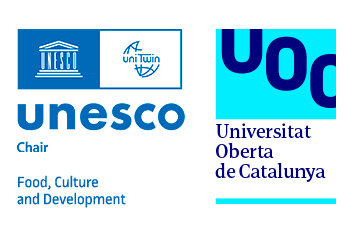The UNESCO Chair on Food, Culture and Development aims to promote research and education in three main areas: food, culture (including knowledge, social diversity and different local adaptations, as well as territory and aspects such as localism vs globalism) and development (covering areas such as nutrition, rural development, local and global economics, business, communication, regulations, the promotion of best practices, etc.).

The aim of the UNESCO Chair on Food, Culture and Development is to promote, through research and education, an understanding of food as a social and cultural element. It does so by enhancing the links between education, research and development of sustainable agriculture, and by focusing on the role of ICT and digital literacy thanks to the University’s experience and expertise.
The UNESCO Chair on Food, Culture and Development is structured as follows:
-
Director
Dr. F. Xavier Medina -
Secretary
Mr. Jordi Bages-Querol -
Executive Council
Dr. Alícia Aguilar
Dr. F. Xavier Medina
Dr. Jordi Tresserras
Dr. Laura Solanilla - Advisory Council

Food plays a central role in our societies, cultures, economies and personal lives, but few understand how food makes it to our plates. Our programmes are designed for individuals interested in enhancing their understanding and analysis of agriculture and food policy, and increasing their understanding of the social, cultural and economic factors that influence and shape the development and enforcement of agriculture governance.
This combination presents an opportunity to explore connections between the historical, political, scientific, strategic and ethical considerations involved in the organization of food policy and agriculture internationally. The programmes train students to identify and generate solutions for just and sustainable food systems. It attracts a diversity of learners from professionals to those just starting their careers. All of our students share an interest in the organization of food systems and in food governance.
Activities
Right to Food Week
Since 2016 the UOC organizes the Right to Food Week, seven days of activities that look to highlight the advantages of consuming local and seasonal produce in terms of our health and our contribution to a more sustainable world.
Food, Internet and Social Media
39th International ICAF Conference (2014). This conference aimed to be an opportunity to discuss the global-local influence of the Internet and the virtual social media on the state of Food Culture and cultures.

